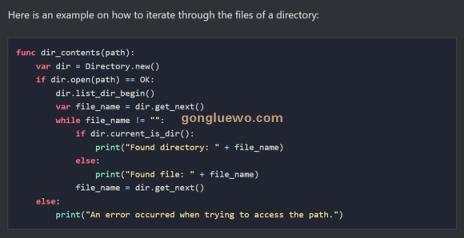首先
fun myfunction():
Projectsettings.load resource_pack("res://mod.pck")
# Now one can use the assets as if they had them in the project from the start
var imported scene = load("res:/mod.scene.tscn")比如装MOD,需要运行游戏后读取mods文件夹里的mod文件。
上面这段读取外部MOD的代码可以,但是需要指定MOD文件的名称

然后上面这段识别目录下所有文件的代码本来可以完美解决。但是这段代码只能在编辑器里使用。如果导出后,即使有正确路径,上面第三行"if dir.open(path) == OK:" 也会判断为False,导致无法识别外部文件夹里的文件。
所以,导出游戏后,怎么识别mods文件夹里文件的名字?

第一行外部读取不行,第二行外部读取可以。
代码
Load mods("res://mods/")
load mods(Projectsettings.globalize path("res://mods/"))
在 Godot 引擎中,实现自动加载 "mod"(模组)的功能通常涉及动态加载脚本、场景或资源,并在游戏运行时应用它们。虽然 Godot 本身没有内置的“模组系统”,但你可以通过一些设计模式和 Godot 的功能来实现类似的效果。以下是一个基本的实现思路:
实现步骤:
定义模组接口:
创建一个接口或基类,定义模组应该实现的方法和属性。这可以通过 GDScript 接口或抽象基类来实现。
模组目录结构:
在项目的某个目录中(例如 res://mods/),为每个模组创建一个子目录。
每个模组目录中包含模组的资源、脚本和配置文件。
自动加载模组配置:
在游戏启动时,扫描 mods/ 目录,读取每个模组的配置文件(例如 JSON 或自定义格式),了解模组的基本信息(如名称、版本、依赖等)。
动态加载模组脚本:
使用 load() 或 preload() 函数动态加载模组脚本。
实例化模组对象,并调用其初始化方法。
注册模组到游戏系统:
将加载的模组对象注册到游戏的主系统中,以便在游戏过程中调用它们的方法。
示例代码:
以下是一个简化的示例,展示如何动态加载和初始化模组:
最后:
# 假设我们有一个基类或接口 ModBase,所有模组都继承自它
class_name ModBase
extends Node
func initialize(game):
pass # 模组初始化方法,子类需要实现
# 游戏主脚本
extends Node
var mods = []
func _ready():
load_mods()
func load_mods():
var mods_dir = "res://mods/"
var dir = Directory.new()
if dir.open(mods_dir) == OK:
dir.list_dir_begin(true, true)
var file_name = dir.get_next()
while file_name != "":
if dir.current_is_dir():
var mod_path = mods_dir + file_name + "/mod.gd"
if File.new().file_exists(mod_path):
var mod_script = load(mod_path)
var mod_instance = mod_script.new()
if mod_instance is ModBase:
mod_instance.initialize(self) # 假设游戏主脚本是 self
mods.append(mod_instance)
else:
print("Error: Mod does not inherit from ModBase")
file_name = dir.get_next()
dir.list_dir_end()
else:
print("Error: Could not open mods directory")
# 示例模组脚本 (res://mods/example_mod/mod.gd)
# class_name ExampleMod
# extends ModBase
#
# func initialize(game):
# print("ExampleMod initialized")
TAGS
Godot
分享: